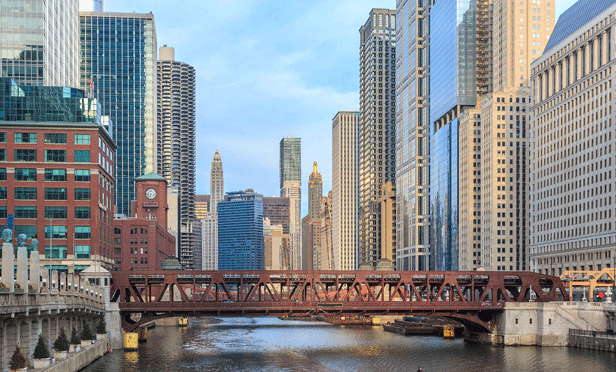CHICAGO—The national economy seems to have gotten a bit of a spring back in its step after inclement weather caused a deterioration earlier in the year, and the Chicago region has also shown strength recently, especially in office jobs, according to MBRE's second quarter report.
“As of the June 2014 release of the US Bureau of Labor Statistics census, the national unemployment rate had fallen to 6.1%,” the company's report notes. “A 60 bp drop from last quarter, unemployment now sits at the lowest level since September of 2008.” The US economy has added more than 200,000 jobs a month for the past five months, a record of consecutive job growth not seen since the 1990s.
Professional and business services came back strong during the spring, MBRE notes. The US economy averaged a gain of 67,000 office jobs in May and June, exceeding the average monthly gain of 56,000 over the past 12 months. Chicago was not left out of this expansion. Employment in the city's professional and business services rose by 1.7% year-to-date. “This is the largest growth for the period of any nonfarm industry.”
And Chicago continued to see more business activity, although growth in June was slower than earlier in the year. Market News International's Chicago Business Barometer fell to 62.6 by the end of June, down from a seven-month high of 65.5 in May, MBRE says. Still, it remains well above both the 50 index baseline and the 52 it hit one year ago.
In addition to a solid performance in the office sector, Chicago has also seen its hotels prosper. Citing recently released statistics from Choose Chicago, the city's marketing organization, MBRE says that tourism in 2013 surpassed the previous year's record-setting performance. “The city was host 46.96 million domestic and 1.42 million international travelers, a 4.3% increase from 2012.”
However, “in the midst of this generally positive news on employment and cultural relevance, Chicago still faces a host of internal issues,” MBRE notes. The much-discussed pension and debt problems, for example, will be “shouldered by a shrunken population.” The city added only 5,862 people in the last year ending July 1st, and this 0.2% “growth is dead last amongst major cities tracked by the Economist.” And this slow growth comes after the city lost about 200,000 people between 2000 and 2010.
Furthermore, MBRE researchers say that Mayor Rahm Emanuel's recent proposal to boost the city property tax by $200 million would mean that office building owners paid an extra $140 million. “Chicago already has the second highest commercial tax rate behind Detroit.”
“The next quarter will be a significant one for the CBD,” the researchers conclude. “Chicagoans should be optimistic regarding the improving employment situation, growing business and continued relevance of the city, but our economic recovery still faces some substantial hurdles.”
Want to continue reading?
Become a Free ALM Digital Reader.
Once you are an ALM Digital Member, you’ll receive:
- Breaking commercial real estate news and analysis, on-site and via our newsletters and custom alerts
- Educational webcasts, white papers, and ebooks from industry thought leaders
- Critical coverage of the property casualty insurance and financial advisory markets on our other ALM sites, PropertyCasualty360 and ThinkAdvisor
Already have an account? Sign In Now
*May exclude premium content© 2024 ALM Global, LLC, All Rights Reserved. Request academic re-use from www.copyright.com. All other uses, submit a request to [email protected]. For more information visit Asset & Logo Licensing.








